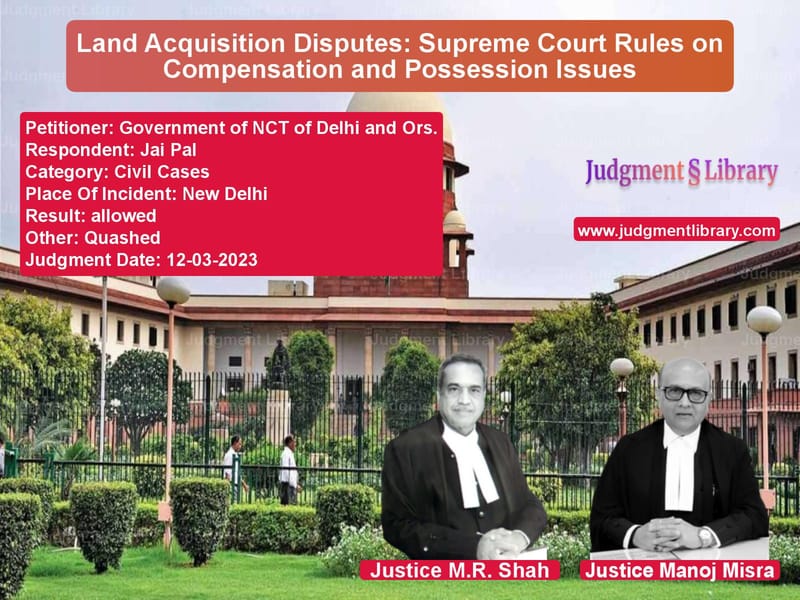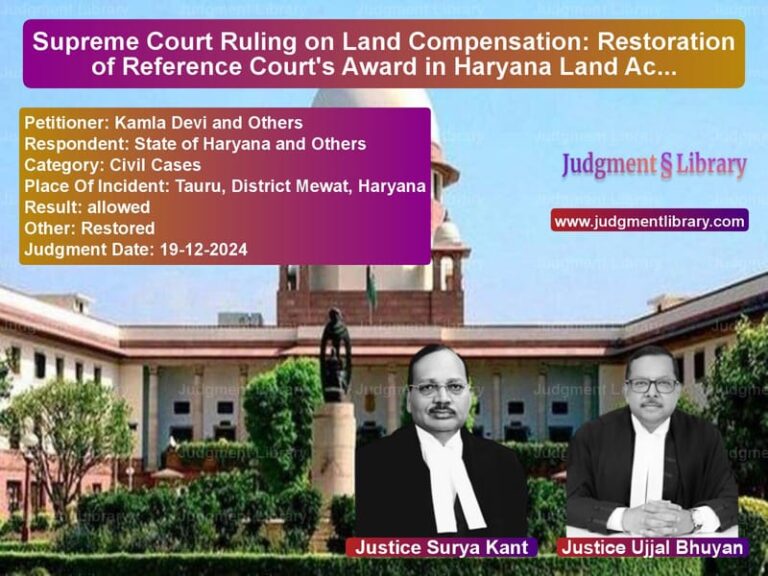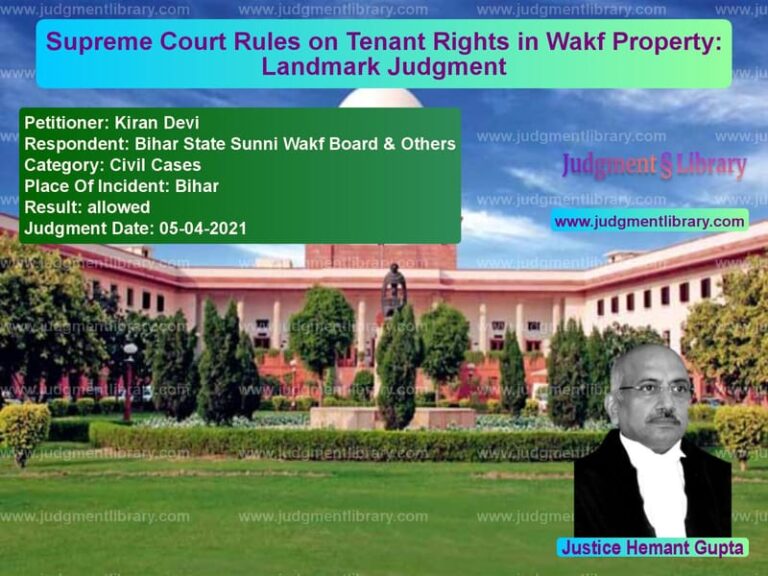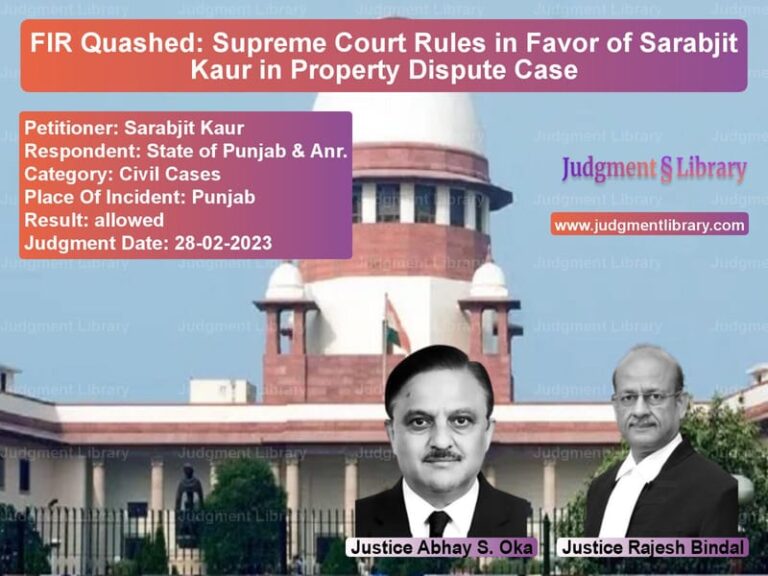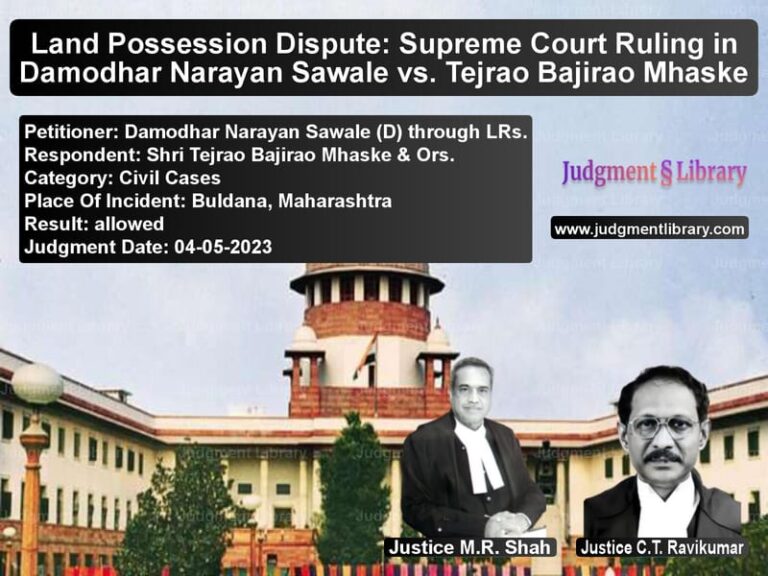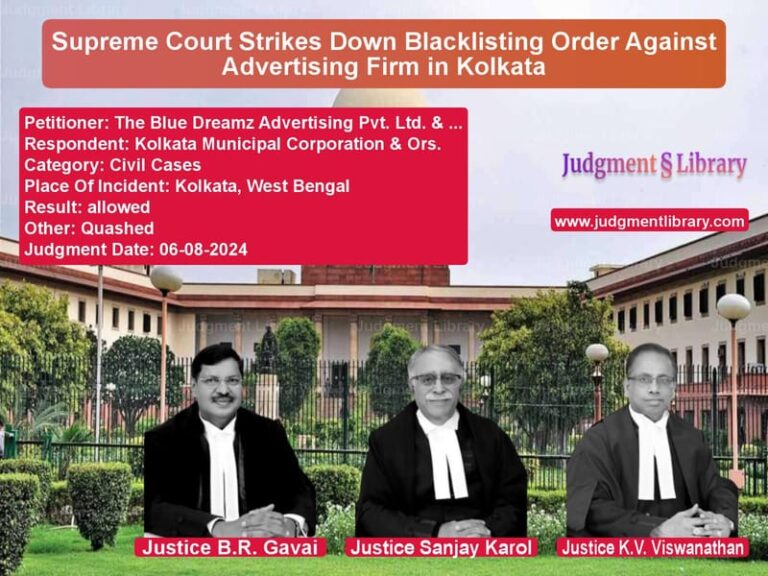Land Acquisition Disputes: Supreme Court Rules on Compensation and Possession Issues
The case of Government of NCT of Delhi and Ors. v. Jai Pal revolves around the interpretation of land acquisition laws in India, particularly concerning the deemed lapse of acquisition proceedings under Section 24(2) of the Right to Fair Compensation and Transparency in Land Acquisition, Rehabilitation, and Resettlement Act, 2013. The Supreme Court had to decide whether the acquisition of the land in question had lapsed due to the alleged failure to compensate the landowner.
The High Court of Delhi had ruled in favor of the landowner, declaring that the acquisition proceedings initiated under the Land Acquisition Act, 1894 had lapsed. This decision was based on the precedent set by the Supreme Court in Pune Municipal Corporation v. Harakchand Misirimal Solanki. However, this precedent was later overturned by a Constitution Bench of the Supreme Court in Indore Development Authority v. Manoharlal, leading to a fresh examination of the issue.
Background of the Case
The dispute began when the Government of NCT of Delhi initiated land acquisition proceedings under the Land Acquisition Act, 1894. The landowner, Jai Pal, challenged the acquisition, claiming that:
- Possession of the land had never been taken by the government.
- Compensation for the land had not been paid.
- Under Section 24(2) of the Land Acquisition Act, 2013, the acquisition should be deemed to have lapsed.
The Delhi High Court ruled in favor of the landowner, relying on the Supreme Court’s decision in Pune Municipal Corporation, which held that if compensation was not paid, the acquisition would lapse.
Arguments by the Parties
Arguments by the Appellants (Government of NCT of Delhi)
The government, represented by its legal counsel, argued:
- Possession of the land was taken on July 11, 2008.
- The High Court had wrongly relied on Pune Municipal Corporation, which had been overruled by the Supreme Court’s Constitution Bench in Indore Development Authority.
- As per the ruling in Indore Development Authority, mere non-payment of compensation did not lead to a lapse of acquisition if possession had been taken.
- The judgment of the High Court was incorrect and should be set aside.
Arguments by the Respondent (Jai Pal)
The respondent’s legal counsel countered:
- Even if possession was taken, the lack of compensation justified the lapse of acquisition.
- The High Court had correctly applied the law as understood at the time.
- The government had failed to follow due process in compensating the landowner.
Supreme Court’s Legal Analysis
Relevance of the Indore Development Authority Case
The Supreme Court revisited its Constitution Bench decision in Indore Development Authority, which had overruled Pune Municipal Corporation. The ruling clarified several key points regarding the lapse of acquisition:
“The word ‘or’ used in Section 24(2) between possession and compensation has to be read as ‘nor’ or as ‘and’. The deemed lapse of land acquisition proceedings takes place where due to inaction of authorities for five years or more prior to commencement of the Act, possession has not been taken nor compensation has been paid.”
The Supreme Court ruled that:
- If either possession had been taken or compensation had been paid, the acquisition would not lapse.
- In cases where possession was taken but compensation was not paid, the landowner could seek monetary remedies but not a declaration that the acquisition had lapsed.
- The decision in Pune Municipal Corporation was incorrect and could no longer be relied upon.
Findings in the Present Case
The Supreme Court found that:
- The government had provided evidence that possession of the land was taken on July 11, 2008.
- Since possession had been taken, the acquisition had not lapsed under Section 24(2) of the 2013 Act.
- The High Court had incorrectly applied the law by relying on a now-overruled precedent.
Final Judgment by the Supreme Court
The Supreme Court allowed the appeal, ruling that:
- The acquisition of the land had not lapsed.
- The judgment of the Delhi High Court was set aside.
- The original writ petition filed by Jai Pal was dismissed.
Impact of the Judgment
The judgment reinforces the principles established in Indore Development Authority and provides clarity on the application of Section 24(2) of the Land Acquisition Act, 2013. The ruling confirms that:
- Acquisition does not automatically lapse if compensation is unpaid, provided possession has been taken.
- Landowners who have not received compensation may seek legal remedies but cannot claim that acquisition has lapsed.
- Courts must follow the Constitution Bench’s ruling in Indore Development Authority rather than relying on earlier precedents that have been overruled.
Conclusion
The Supreme Court’s decision in Government of NCT of Delhi v. Jai Pal serves as an important precedent for land acquisition cases in India. It clarifies that mere non-payment of compensation does not automatically result in the lapse of acquisition. This judgment ensures that legal interpretations align with the Constitution Bench ruling in Indore Development Authority, preventing further ambiguities in land acquisition disputes.
Petitioner Name: Government of NCT of Delhi and Ors..Respondent Name: Jai Pal.Judgment By: Justice M.R. Shah, Justice Manoj Misra.Place Of Incident: New Delhi.Judgment Date: 12-03-2023.
Don’t miss out on the full details! Download the complete judgment in PDF format below and gain valuable insights instantly!
Download Judgment: government-of-nct-of-vs-jai-pal-supreme-court-of-india-judgment-dated-12-03-2023.pdf
Directly Download Judgment: Directly download this Judgment
See all petitions in Property Disputes
See all petitions in Landlord-Tenant Disputes
See all petitions in Judgment by Mukeshkumar Rasikbhai Shah
See all petitions in Judgment by Manoj Misra
See all petitions in allowed
See all petitions in Quashed
See all petitions in supreme court of India judgments March 2023
See all petitions in 2023 judgments
See all posts in Civil Cases Category
See all allowed petitions in Civil Cases Category
See all Dismissed petitions in Civil Cases Category
See all partially allowed petitions in Civil Cases Category

